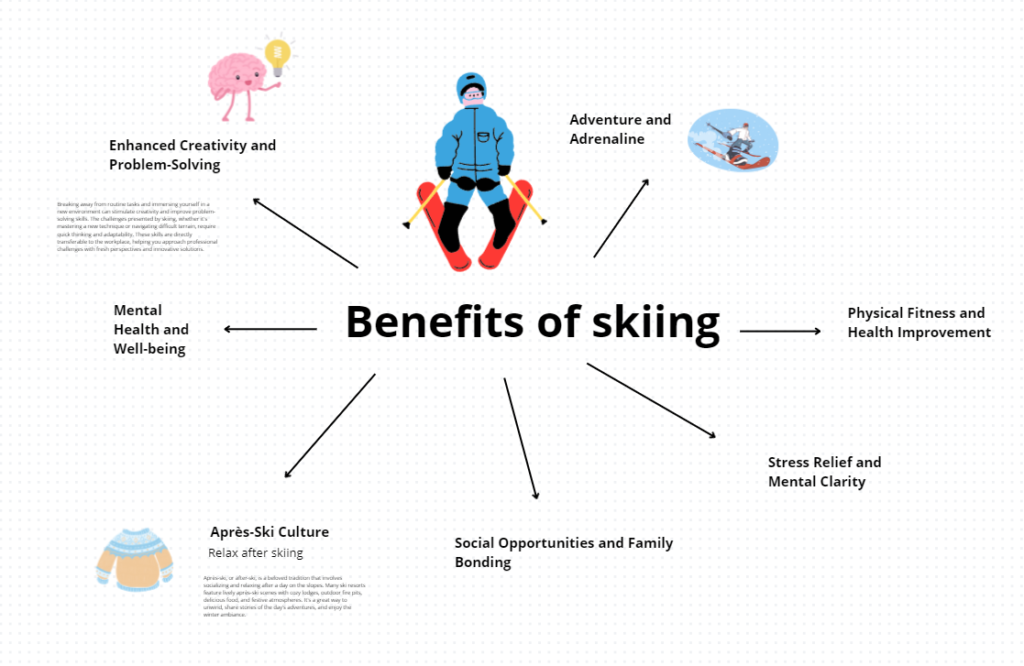Benefits of skiing

Amid the daily grind and constant digital distractions, it’s essential to carve out time for activities that promote physical health, mental well-being, and family bonding. Skiing, a dynamic and exhilarating winter sport, offers a perfect blend of these benefits. This article explores the myriad advantages of skiing, emphasizing its positive impact on family life and overall balance.
Contents
Mental Health Benefits
Stress Reduction, help in decision making
The serene and picturesque mountain environments where skiing takes place offer a stark contrast to the typical urban setting. The combination of physical activity and natural beauty significantly reduces stress levels. The fresh mountain air, coupled with the thrill of skiing, releases endorphins, which act as natural stress relievers.
Skiing requires concentration and quick decision-making, which enhances mental clarity and focus. This mental engagement can help individuals improve their cognitive functions, leading to better problem-solving skills and increased productivity in daily life.
The physical exertion of skiing leads to the release of dopamine and endorphins, chemicals in the brain associated with pleasure and happiness. These “feel-good” hormones can help combat feelings of anxiety and depression, common in high-stress environments.

Physical Health Benefits of skiing
Cardiovascular Fitness
Skiing is an excellent cardiovascular workout. The sport involves various muscles and requires significant physical effort, which increases heart rate and improves cardiovascular health. Regular skiing can help maintain heart health and reduce the risk of cardiovascular diseases, contributing to a healthier lifestyle.
Strength and Endurance
The physical demands of skiing help build strength and endurance. Navigating slopes engages the core, legs, and arms, enhancing muscle tone and overall physical strength. This is especially beneficial for individuals who may have sedentary jobs, offering a counterbalance to the lack of physical activity during the week.
Encourages Mindfulness
Skiing encourages mindfulness, as it requires full attention to the present moment. This focus on the present can help individuals take a break from constant multitasking and mental clutter, promoting a sense of calm and well-being.
Social Benefits of Skiing
Strengthening Family Bonds
Skiing can be enjoyed by individuals of all ages, making it a great activity for family outings. Spending quality time with family on the slopes can strengthen familial bonds and improve overall life satisfaction. The shared experience of skiing can create lasting memories and deepen relationships.
Building Friendships
Skiing is often a social activity, providing opportunities to meet new people and build friendships. Group skiing trips or lessons can foster a sense of community and camaraderie, enhancing social interactions and support networks.
Team Building and Cooperation
Organizing or participating in group skiing activities can develop teamwork and cooperation skills. Planning trips, navigating slopes together, and supporting each other through challenges can translate into better teamwork and collaboration in other areas of life.

Cognitive Benefits
Enhanced Cognitive Function
The physical activity involved in skiing stimulates brain function, improving memory, cognitive flexibility, and creative thinking. These cognitive benefits are valuable for individuals of all ages, contributing to better mental acuity and problem-solving abilities.
Improved Decision-Making
The need to make quick decisions while skiing hones decision-making skills. This ability to assess situations rapidly and respond effectively is beneficial in various aspects of life, from personal decisions to professional challenges.
Long-Term Health Benefits of Skiing
Reduced Risk of Chronic Diseases
Regular physical activity, such as skiing, lowers the risk of chronic diseases like diabetes, hypertension, and obesity. Skiing offers a preventive measure against these health issues, promoting a healthier lifestyle and longevity.
Longevity and Quality of Life
Engaging in regular physical activities like skiing can contribute to a longer, healthier life. The combination of physical fitness, mental well-being, and social interaction provided by skiing promotes overall health and improves quality of life.
Weight Management
Skiing is a high-calorie-burning activity. Depending on intensity and duration, an hour of skiing can burn between 400 to 600 calories. For those looking to manage their weight, skiing provides an enjoyable way to burn calories and maintain a healthy weight.
Skiing requires good balance and coordination. Regular participation in the sport improves proprioception (awareness of body position), balance, and flexibility. This can help prevent injuries and improve overall physical agility.
Après-Ski Culture
Après-ski, which translates to “after ski” in French, refers to the social activities and entertainment that follow a day of skiing or snowboarding. This culture has become an integral part of the winter sports experience, celebrated in ski resorts across the world, from the Alps in Europe to the Rockies in North America. Here’s a closer look at the elements that define après-ski culture:
Historical Roots
The tradition of après-ski dates back to the early 20th century in the European Alps, particularly in Austria, Switzerland, and France. Initially, it was a way for skiers to relax and warm up after a day on the slopes. Over time, it evolved into a vibrant social scene, with ski resorts enhancing their offerings to cater to this growing trend.

Key Elements of Après-Ski
- Social Gathering:
- Après-ski is fundamentally a social activity. Skiers and snowboarders gather at bars, restaurants, and lodges to share stories about their day on the mountain, making new friends and reconnecting with old ones.
- Music and Dancing:
- Music is a cornerstone of après-ski culture. Many après-ski venues feature live bands or DJs playing a mix of genres, from traditional folk music to contemporary hits. Dancing often becomes spontaneous, with ski boots clunking on makeshift dance floors.
- Food and Drink:
- After a day of physical exertion, hearty food and beverages are essential. Popular drinks include mulled wine (vin chaud or glühwein), hot chocolate, beer, and schnapps. The cuisine varies by region but often includes comfort foods like fondue, raclette, and hearty stews.
- Fireplaces and Outdoor Heaters:
- Cozy indoor settings with roaring fireplaces or outdoor patios equipped with heaters create a warm and inviting atmosphere. These spaces allow skiers to relax, often still in their ski gear, adding to the laid-back vibe.
- Hot Tubs and Spas:
- Many ski resorts offer luxurious spa facilities, including hot tubs, saunas, and massage services. These amenities provide a perfect way to soothe tired muscles and unwind after a day on the slopes.
- Local Traditions:
- Each ski region brings its own unique traditions to the après-ski scene. In Austria, for example, you might find traditional alpine music and yodeling, while in Switzerland, après-ski might include sampling local cheeses and chocolates.
Popular Après-Ski Destinations
- St. Anton, Austria: Known for its lively après-ski scene, St. Anton features famous spots like MooserWirt and Krazy Kanguruh, where the partying starts early and continues into the night.
- Chamonix, France: This iconic resort offers a blend of sophisticated and laid-back après-ski options, from chic wine bars to lively pubs with live music.
- Aspen, USA: Aspen combines luxury with vibrant nightlife, offering high-end bars and clubs as well as more casual venues where you can enjoy a drink and live entertainment.
- Zermatt, Switzerland: Zermatt’s après-ski is known for its scenic beauty, with many bars and restaurants offering stunning views of the Matterhorn. Venues like Hennu Stall are popular for their festive atmosphere.
Après-ski culture is more than just an activity; it’s a tradition that brings together people from all walks of life to celebrate their shared love of winter sports. It enhances the ski experience, providing a perfect blend of relaxation, socializing, and entertainment. Whether you’re enjoying a quiet drink by the fire or dancing the night away in your ski boots, après-ski is an essential part of the winter sports lifestyle.
Conclusion
The benefits of skiing extend far beyond the physical. From enhancing cardiovascular health and muscle strength to reducing stress and improving cognitive function, skiing offers a comprehensive wellness package. The social and family bonding opportunities further add to its appeal, making it an ideal activity for those looking to balance their lives with a healthy, fulfilling pastime. Embracing skiing as part of a regular wellness routine can lead to significant improvements in physical health, mental clarity, and overall quality of life, making it a valuable investment for individuals and families alike.
